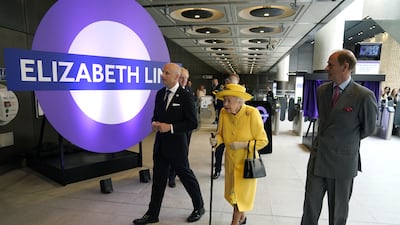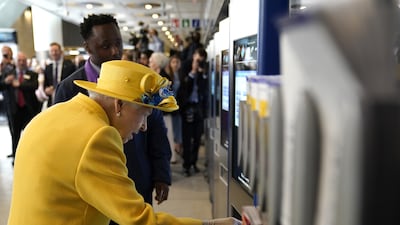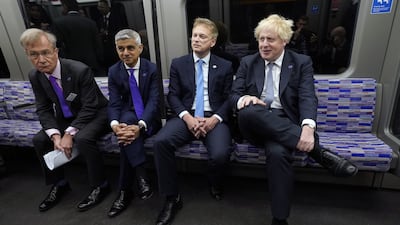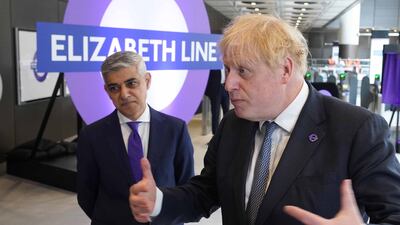The first Elizabeth line train from Paddington through central London departed at 6.33am on Tuesday, carrying hundreds of excited transport enthusiasts.
Hundreds of people gathered in an attempt to be among the first passengers on the new Elizabeth Tube line, which has changed the London Underground map.
Transport enthusiasts hailed the “momentous occasion”, having travelled from across the country for the ceremony and queued from the early hours of the morning.
About 300 people queued outside Paddington Station before the service’s opening at 6.30am, and the crowd cheered and rushed forwards when the doors opened at about 6.20am.
The first train departed on time at 6.33am.
However, the smooth start was marred just a few hours later when passengers were evacuated at Paddington Station and parts of the line suspended.
Travellers posted updates on social media.
Only two weeks away from her platinum jubilee celebration, she now rarely carries out public engagements because she walks with difficulty.
Transport for London (TfL) estimates that annual passenger numbers will reach 170 million by 2026.
Last week, the line was officially opened by Queen Elizabeth II, who made a surprise appearance at Paddington station to inspect the new multibillion pound line, named in her honour.
Crossrail, the project to build the new east-west railway, was delayed and ran over budget because of numerous issues including construction difficulties and complications while installing signalling systems.
It was due to be completed in December 2018, with a budget of £14.8 billion set in 2010.
The total cost has been estimated at £18.9 billion, including £5.1 billion from the government.
The Elizabeth line will boost capacity and cut journey times for travel across the capital.
It will stretch from Reading, in Berkshire, and Heathrow Airport, in west London, to Shenfield, in Essex, and Abbey Wood, in south-east London.
Trains will initially operate in three sections, which are expected to be integrated in the autumn.
Some lifts at some stations on London's new Elizabeth line will go sideways, not straight up, due to their diagonal design that is cheaper to build and will save on energy.
The opening of the long-awaited Elizabeth line will have benefits beyond the capital, both Prime Minister Boris Johnson and the city’s mayor have said.
The prime minister said the whole country will “reap the rewards” of a predicted multibillion pound boost to the economy.
Colin Kelso, 18, travelled down from Glasgow for the event and wore a hoody emblazoned with “Purple train” on the front, in a nod to the line’s colour scheme.
He told the PA news agency: “I want to get on the first train.
“I’ve always liked trains and have been keeping up to date with the project.”
Danny McLaren, 21, from Edinburgh, arrived at Paddington at 1.30am, and described the event as “an epic day”.
“We’ve known it will open for a while,” he told PA.
“It’s a brand new railway. New technology. New trains.
“It’s an epic day to experience it when it’s brand new.”
Another passenger, Hakim Colclough, 24, from Chessington, Surrey, said: “This is a momentous occasion.
“It’s a once-in-a-lifetime thing.”
Colin Farmer, 84, from Croydon, south-east London, arrived at 4.30am.
He said: “It’s history. It’s about time there were trains right through London without changing to the Underground.
“I’m very excited. We’ve been waiting long enough for it.
“It’s a great achievement.”
Mr Johnson said: “As the Elizabeth line opens to the public, we know it’s not just Londoners that will reap the rewards, but the whole country — because better transport grows the economy, levels up opportunity and creates jobs.”
The government said the Elizabeth line project is supporting 55,000 jobs and 1,000 apprenticeships and is forecast to boost the economy by £42 billion.
London mayor Sadiq Khan, who also travelled on the first train, said: “It’s a landmark day.
“I’m excited. I’m like the little boy before Christmas.”
Mr Khan, echoed the PM’s sentiments, saying the line’s opening would “provide a crucial economic boost to the whole country”.
He said: “Today is a historic day as the Elizabeth line opens to passengers. This is a huge moment, not just for London but the entire country, particularly in this special Jubilee year.
“This brand new line is the most significant addition to our transport network in decades.
“It will add billions to our economy and is set to serve up to 200 million passengers each year. I’m sure passengers will enjoy the modern trains, beautiful step-free stations and the reduced journey times across the capital and the south-east.
“The Elizabeth line is much more than just a new railway, it will provide a crucial economic boost to the whole country and help to turbo-charge our recovery from the pandemic.”
Labour dispute
The insured employee may still file an ILOE claim even if a labour dispute is ongoing post termination, but the insurer may suspend or reject payment, until the courts resolve the dispute, especially if the reason for termination is contested. The outcome of the labour court proceedings can directly affect eligibility.
- Abdullah Ishnaneh, Partner, BSA Law
The President's Cake
Director: Hasan Hadi
Starring: Baneen Ahmad Nayyef, Waheed Thabet Khreibat, Sajad Mohamad Qasem
Rating: 4/5
The%20specs
%3Cp%3E%3Cstrong%3EEngine%3A%3C%2Fstrong%3E%20Twin-turbocharged%204-litre%20V8%0D%3Cbr%3E%3Cstrong%3EPower%3A%20%3C%2Fstrong%3E542bhp%0D%3Cbr%3E%3Cstrong%3ETorque%3A%20%3C%2Fstrong%3E770Nm%0D%3Cbr%3E%3Cstrong%3ETransmission%3A%20%3C%2Fstrong%3EEight-speed%20automatic%0D%3Cbr%3E%3Cstrong%3EPrice%3A%20%3C%2Fstrong%3EFrom%20Dh1%2C450%2C000%3Cbr%3E%3Cstrong%3EOn%20sale%3A%20%3C%2Fstrong%3ENow%3C%2Fp%3E%0A
More from our neighbourhood series:
COMPANY%20PROFILE
%3Cp%3E%3Cstrong%3EName%3A%20%3C%2Fstrong%3EKinetic%207%3Cbr%3E%3Cstrong%3EStarted%3A%3C%2Fstrong%3E%202018%3Cbr%3E%3Cstrong%3EFounder%3A%3C%2Fstrong%3E%20Rick%20Parish%3Cbr%3E%3Cstrong%3EBased%3A%3C%2Fstrong%3E%20Abu%20Dhabi%2C%20UAE%3Cbr%3E%3Cstrong%3EIndustry%3A%3C%2Fstrong%3E%20Clean%20cooking%3Cbr%3E%3Cstrong%3EFunding%3A%3C%2Fstrong%3E%20%2410%20million%3Cbr%3E%3Cstrong%3EInvestors%3A%3C%2Fstrong%3E%20Self-funded%3C%2Fp%3E%0A
Abu%20Dhabi%E2%80%99s%20Racecard
%3Cp%3E%0D5pm%3A%20Al%20Bithnah%20%E2%80%93%20Maiden%20(PA)%20Dh80%2C000%20(Turf)%201%2C200m%0D%3Cbr%3E5.30pm%3A%20Al%20Khari%20%E2%80%93%20Hanidcap%20(PA)%20Dh80%2C000%20(T)%201%2C200m%0D%3Cbr%3E6pm%3A%20Al%20Qor%20%E2%80%93%20Handicap%20(PA)%20Dh80%2C000%20(T)%201%2C600m%0D%3Cbr%3E6.30pm%3A%20Wathba%20Stallions%20Cup%20%E2%80%93%20Handicap%20(PA)%20Dh70%2C000%20(T)%201%2C600m%0D%3Cbr%3E7pm%3A%20Al%20Badiyah%20%E2%80%93%20Handicap%20(PA)%20Dh80%2C000%20(T)%202%2C200m%0D%3Cbr%3E7.30pm%3A%20Al%20Hayl%20%E2%80%93%20Handicap%20(TB)%20Dh80%2C000%20(T)%202%2C200m%3C%2Fp%3E%0A
The Sand Castle
Director: Matty Brown
Stars: Nadine Labaki, Ziad Bakri, Zain Al Rafeea, Riman Al Rafeea
Rating: 2.5/5
England's all-time record goalscorers:
Wayne Rooney 53
Bobby Charlton 49
Gary Lineker 48
Jimmy Greaves 44
Michael Owen 40
Tom Finney 30
Nat Lofthouse 30
Alan Shearer 30
Viv Woodward 29
Frank Lampard 29
Key findings of Jenkins report
- Founder of the Muslim Brotherhood, Hassan al Banna, "accepted the political utility of violence"
- Views of key Muslim Brotherhood ideologue, Sayyid Qutb, have “consistently been understood” as permitting “the use of extreme violence in the pursuit of the perfect Islamic society” and “never been institutionally disowned” by the movement.
- Muslim Brotherhood at all levels has repeatedly defended Hamas attacks against Israel, including the use of suicide bombers and the killing of civilians.
- Laying out the report in the House of Commons, David Cameron told MPs: "The main findings of the review support the conclusion that membership of, association with, or influence by the Muslim Brotherhood should be considered as a possible indicator of extremism."
Timeline
2012-2015
The company offers payments/bribes to win key contracts in the Middle East
May 2017
The UK SFO officially opens investigation into Petrofac’s use of agents, corruption, and potential bribery to secure contracts
September 2021
Petrofac pleads guilty to seven counts of failing to prevent bribery under the UK Bribery Act
October 2021
Court fines Petrofac £77 million for bribery. Former executive receives a two-year suspended sentence
December 2024
Petrofac enters into comprehensive restructuring to strengthen the financial position of the group
May 2025
The High Court of England and Wales approves the company’s restructuring plan
July 2025
The Court of Appeal issues a judgment challenging parts of the restructuring plan
August 2025
Petrofac issues a business update to execute the restructuring and confirms it will appeal the Court of Appeal decision
October 2025
Petrofac loses a major TenneT offshore wind contract worth €13 billion. Holding company files for administration in the UK. Petrofac delisted from the London Stock Exchange
November 2025
180 Petrofac employees laid off in the UAE
Rebel%20Moon%20%E2%80%93%20Part%20Two%3A%20The%20Scargiver%20review%20
%3Cp%3E%3Cstrong%3EDirector%3A%3C%2Fstrong%3E%20Zack%20Snyder%3Cbr%3E%3Cstrong%3EStarring%3A%3C%2Fstrong%3E%20Sofia%20Boutella%2C%20Charlie%20Hunnam%2C%20Ed%20Skrein%2C%20Sir%20Anthony%20Hopkins%3Cbr%3E%3Cstrong%3ERating%3A%3C%2Fstrong%3E%202%2F5%3Cbr%3E%3Cbr%3E%3C%2Fp%3E%0A
RESULTS
5pm: Maiden (PA) Dh80,000 1,400m, Winner SS Lamea, Saif Al Balushi (jockey), Ibrahim Al Hadhrami (trainer).
5.30pm: Wathba Stallions Cup Handicap (PA) Dh70,000 1,400m, Winner AF Makerah, Sean Kirrane, Ernst Oertel
6pm: Handicap (PA) Dh80,000 1,600m, Winner Maaly Al Reef, Brett Doyle, Abdallah Al Hammadi
6.30pm: Handicap (PA) Dh90,000 1,600m, Winner AF Momtaz, Antonio Fresu, Musabah Al Muhairi
7pm: Handicap (PA) Dh80,000 2,200m, Winner Morjanah Al Reef, Brett Doyle, Abdallah Al Hammadi
7.30pm: Handicap (TB) Dh100,000 2,200m, Winner Mudarrab, Jim Crowley, Erwan Charpy
Tips to keep your car cool
- Place a sun reflector in your windshield when not driving
- Park in shaded or covered areas
- Add tint to windows
- Wrap your car to change the exterior colour
- Pick light interiors - choose colours such as beige and cream for seats and dashboard furniture
- Avoid leather interiors as these absorb more heat
THE SPECS
Aston Martin Rapide AMR
Engine: 6.0-litre V12
Transmission: Touchtronic III eight-speed automatic
Power: 595bhp
Torque: 630Nm
Price: Dh999,563
UAE squad to face Ireland
Ahmed Raza (captain), Chirag Suri (vice-captain), Rohan Mustafa, Mohammed Usman, Mohammed Boota, Zahoor Khan, Junaid Siddique, Waheed Ahmad, Zawar Farid, CP Rizwaan, Aryan Lakra, Karthik Meiyappan, Alishan Sharafu, Basil Hameed, Kashif Daud, Adithya Shetty, Vriitya Aravind
Company profile
Name: Fruitful Day
Founders: Marie-Christine Luijckx, Lyla Dalal AlRawi, Lindsey Fournie
Based: Dubai, UAE
Founded: 2015
Number of employees: 30
Sector: F&B
Funding so far: Dh3 million
Future funding plans: None at present
Future markets: Saudi Arabia, potentially Kuwait and other GCC countries
Haircare resolutions 2021
From Beirut and Amman to London and now Dubai, hairstylist George Massoud has seen the same mistakes made by customers all over the world. In the chair or at-home hair care, here are the resolutions he wishes his customers would make for the year ahead.
1. 'I will seek consultation from professionals'
You may know what you want, but are you sure it’s going to suit you? Haircare professionals can tell you what will work best with your skin tone, hair texture and lifestyle.
2. 'I will tell my hairdresser when I’m not happy'
Massoud says it’s better to offer constructive criticism to work on in the future. Your hairdresser will learn, and you may discover how to communicate exactly what you want more effectively the next time.
3. ‘I will treat my hair better out of the chair’
Damage control is a big part of most hairstylists’ work right now, but it can be avoided. Steer clear of over-colouring at home, try and pursue one hair brand at a time and never, ever use a straightener on still drying hair, pleads Massoud.
UAE currency: the story behind the money in your pockets
More from Rashmee Roshan Lall
TEST SQUADS
Bangladesh: Mushfiqur Rahim (captain), Tamim Iqbal, Soumya Sarkar, Imrul Kayes, Liton Das, Shakib Al Hasan, Mominul Haque, Nasir Hossain, Sabbir Rahman, Mehedi Hasan, Shafiul Islam, Taijul Islam, Mustafizur Rahman and Taskin Ahmed.
Australia: Steve Smith (captain), David Warner, Ashton Agar, Hilton Cartwright, Pat Cummins, Peter Handscomb, Matthew Wade, Josh Hazlewood, Usman Khawaja, Nathan Lyon, Glenn Maxwell, Matt Renshaw, Mitchell Swepson and Jackson Bird.
UAE currency: the story behind the money in your pockets
The specs
Engine: four-litre V6 and 3.5-litre V6 twin-turbo
Transmission: six-speed and 10-speed
Power: 271 and 409 horsepower
Torque: 385 and 650Nm
Price: from Dh229,900 to Dh355,000
Winners
Best Men's Player of the Year: Kylian Mbappe (PSG)
Maradona Award for Best Goal Scorer of the Year: Robert Lewandowski (Bayern Munich)
TikTok Fans’ Player of the Year: Robert Lewandowski
Top Goal Scorer of All Time: Cristiano Ronaldo (Manchester United)
Best Women's Player of the Year: Alexia Putellas (Barcelona)
Best Men's Club of the Year: Chelsea
Best Women's Club of the Year: Barcelona
Best Defender of the Year: Leonardo Bonucci (Juventus/Italy)
Best Goalkeeper of the Year: Gianluigi Donnarumma (PSG/Italy)
Best Coach of the Year: Roberto Mancini (Italy)
Best National Team of the Year: Italy
Best Agent of the Year: Federico Pastorello
Best Sporting Director of the Year: Txiki Begiristain (Manchester City)
Player Career Award: Ronaldinho
more from Janine di Giovanni





















